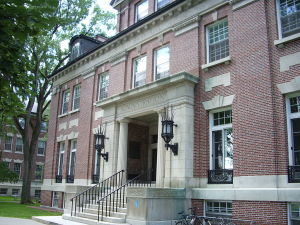
For a small college, such a drift is a cultural calamity and challenges the very nature of its identity as a place where personal interaction and individual learning flourish.
In his 1914 essay, “What Publicity Can Do,” future Supreme Court Justice Louis Brandeis noted that “Sunlight is said to be the best of disinfectants” and the “most efficient of policemen.” As winter draws near, our small college appears to be facing a dearth of illumination in more ways than one: the days grow shorter, the shadows grow longer, and the obscurities of the administration’s activities grow ever darker.
In recent weeks and months, Dartmouth’s expansive bureaucracy has reached new heights and stooped to new lows, shutting students out of essential debates and closing themselves off from avenues of inquiry. In a variety of instances, the College’s many offices have been unwilling to make themselves available to their constituents, preferring instead to remain aloof from the interests and concerns of undergraduates. Now, it would appear that opacity reigns as the law of the land, and “transparency” has joined “discussion” as another rhetorical prop for the powers that be.
One needn’t look far to see examples of this devolution in action; even the composition of this issue is fraught with obstruction. Since the beginning of the term, The Dartmouth Review has repeatedly reached out to the administration for information regarding its self-defense policies. Our intent was to assemble a variety of sources so that we could adequately “explore the policies and opinions regarding the use of personal defense items by both [Safety & Security] and students” on Dartmouth’s campus. Given the controversy that resulted from an undergraduate’s recent request to carry a concealed firearm on College property, such an article seemed like a timely and effective addition to the campus discourse. It’s a shame, then, that the administration didn’t seem to agree.
Over the course of the last four weeks, our eleven separate emails to six different employees yielded only variations on the same response: “Thanks for the opportunity, but we are going to decline.” Without an official statement, our attempt to clarify College policy on this issue and explore its motives and logic was for naught. One can only wonder why the Hanlon Administration, which has made paeans to transparency a hallmark of its official rhetoric, is unwilling to speak to a campus news outlet about a topic that it addressed so freely when it made the national press. If it isn’t inclined to supply basic facts for an informational article, what is it actually willing to reveal?
Nor does this opacity end there: there are innumerable other instances elsewhere in campus life. Take for example The Review’s efforts at organizing a public event for later this term. Since early March, we have been working with a variety of organizations to bring a panel discussion about energy policy to campus. To that end, we sent a series of emails to Jenna Musco, the manager of the College’s sustainability program, to understand how we might involve her and her office in its organization. In the three weeks since, all has been quiet on the environmental front, and we have yet to hear a word from Ms. Musco or any of her colleagues about our inquiries. In the interim, The Review has only succeeded in gaining traction with the administration through our partners in the Sierra Club. Although it is an outside organization with no direct ties to the College, it has proven far more effective at navigating the politics of Dartmouth than we have. These circumstances suggest that even though the College’s sustainability program claims to be “supported, guided, and driven by Dartmouth students,” it is not particularly keen on actually working with them unless its external perception is at stake.
While both of these examples may be but isolated instances of bureaucratic negligence, the frequency with which students encounter similar issues seems to belie a disturbing trend toward administrative detachment and inattentiveness on campus. Much of this issue appears to be the result of College’s excess in the payroll department, which has made seeking help and completing basic tasks a highly impersonal and incoherent process.
In recent years, The Review has been a consistent critic of the College’s hiring policies and the explosion in the size of the non-academic staff. Although many of our objections have focused on its implications for Dartmouth’s financial structure, we have also expressed much consternation about its costs for student life. Now these concerns seem to have been borne out in our recent experiences. Despite the fact that Dartmouth has almost as many employees as it does students, our writers have had far more success contacting sitting U.S. Senators and former UN ambassadors than they’ve had reaching out to their own administrative offices. Such an experience confirms the popular campus perception that non-academic resources have become less responsive to student needs as an ever-larger quantity of employees has reduced the overall quality of the services they provide.
As Dartmouth continues to cast its gaze inward and search for ways it can improve itself, this problem would appear to be a prime target for review. Experiences like the above are not unique to The Dartmouth Review; instead, they are indicative of a campus climate that has progressively deemphasized the caliber of the student experience as its top priority and grown increasingly concerned with protecting its own profile. For a small college, such a drift is a cultural calamity and challenges the very nature of its identity as a place where personal interaction and individual learning flourish. To right it, the administration needs to make good on its promises for transparency and allow Brandeis’ “disinfecting sunlight” to illuminate its inner-workings.

Be the first to comment on "The Opacity of Growth"